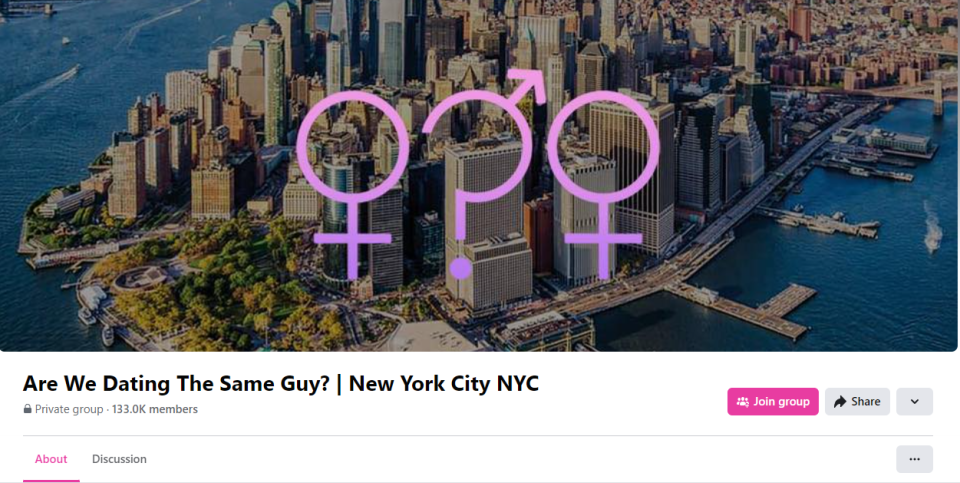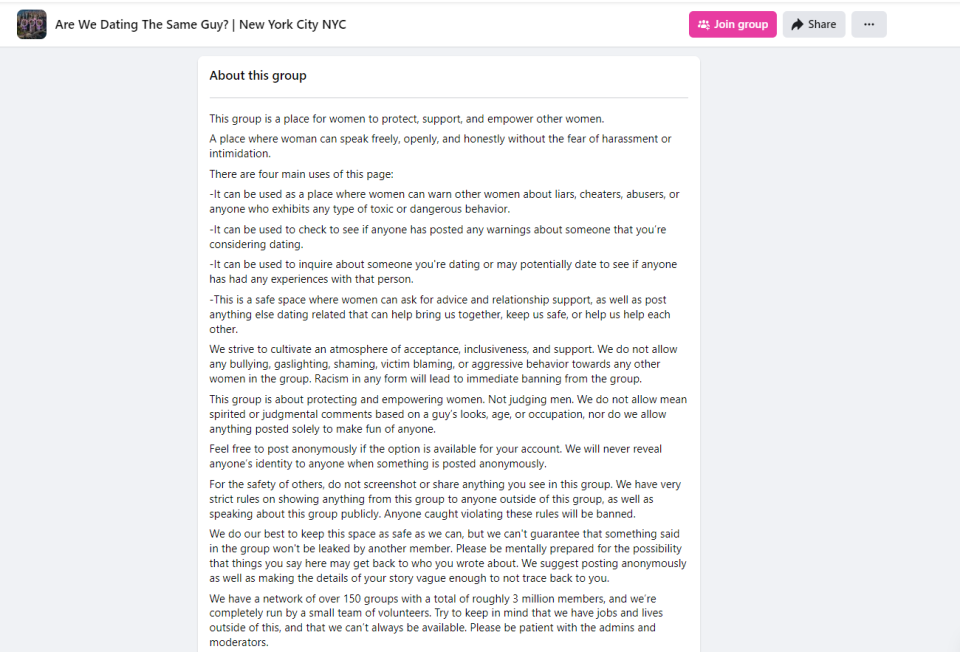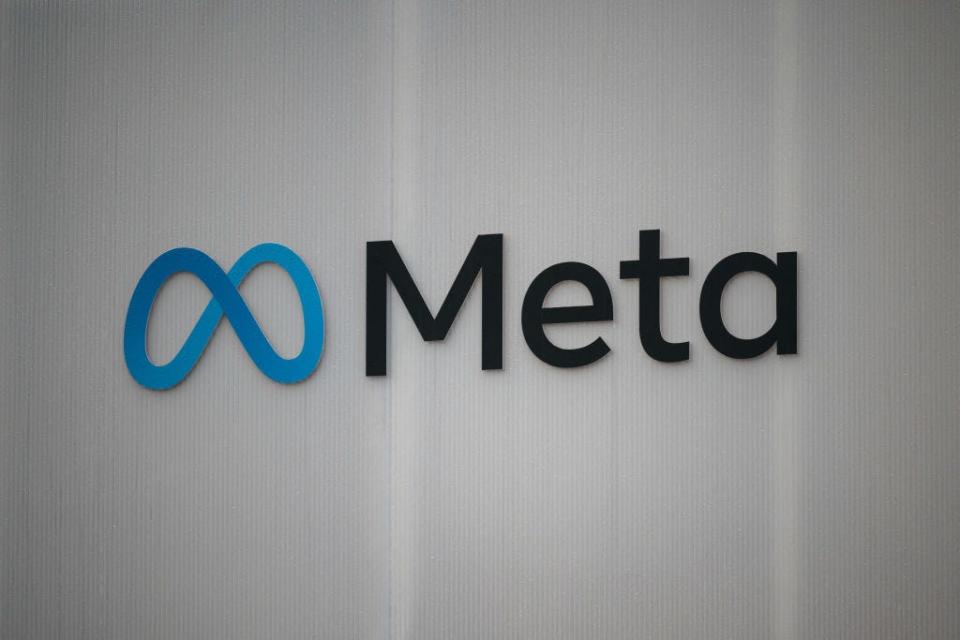'Are We Dating the Same Guy?' What to know about controversial Facebook groups at center of lawsuit
A place to keep women safe or simply to gossip?
That question is at the heart of a lawsuit recently filed against members of a social media group known for giving singles a place to share their experiences and dirty details about others on the dating scene.
"Are We Dating the Same Guy," a series of city and location-specific Facebook pages geared toward single women has become the subject of hot debate in recent weeks, as one man who was spoken about negatively in a Chicago-area group has claimed the post constitutes defamation and an invasion of privacy.

While defenders of the groups say they are a place to let other women know about potentially dangerous or toxic men they may run across while dating locally, others have accused them of being places of baseless gossip and character assassination.
This debate may soon make its way to court, which could shed light on how social media libel and defamation is viewed in the courtroom. Wondering what all the debate is about? Here's what to know.
What is 'Are We Dating the Same Guy?'

"Are We Dating the Same Guy," also known as AWDTSG, is a network of 200 Facebook pages with more than 3.5 million members focused on sharing dating stories and experiences in locales nationwide.
Geared specifically toward cisgender, straight women who are actively dating male singles in the area, the groups cover larger areas, such as NYC as a whole, and more specific locations, such as Brooklyn. Pages exist for major cities and smaller towns and counties.
While the title implies a specific focus on making sure singles in a given area aren't double dipping, cheating or getting caught up in a love triangle, the AWDTSG network focuses on local dating experiences as a whole.
Women post screenshots of men's dating profiles to their specific city's group, asking for red flags or any "tea" (gossip or information) other members can provide. While similar groups have existed before, the first to specifically be part of the AWDTSG network was created for NYC in March 2022. Generally, posts are supposed to include a name and photo but no address, contact or further personal information.
Since its inception, men's rights groups have targeted AWDSTG as a toxic force, launching Reddit pages and mass-reporting campaigns to get the groups removed.
Kids on social media: Questions of parental rights raised as Florida lawmakers push social media ban for minors
Similar groups geared toward men, called "Are We Dating the Same Girl", have spawned in some cities as well, such as the Are We Dating The Same Girl? Washington DC / DMV group with more than 11,000 members.
The group describes itself as a "place for men to protect and empower other men while warning each other of women who might be liars, cheaters, scammers, or exhibit any type of toxic or shady behavior," though some comments make remarks about the attractiveness of women posted in the group.
What is the purpose of 'Are We Dating the Same Guy' groups?
According to founder Paola Sanchez on arewedatingthesameguy.com, AWDTSG is a "safety support community of over 200 groups totaling over 3,500,000 women. We do what we can to help women navigate today's dating landscape."
The site's testimonial page is filled with screenshots of messages and posts from members of the group seemingly thanking the creators. On this page, the network of AWDTSG groups is described as a resource to keep women in the dating scene safe, saying: "Tens of thousands of women around the world have told us they have felt safer, escaped a bad situation, have avoided danger, or have been better prepared when meeting someone for the first time due to our communities."
The website likewise features a "resources" tab that links to state-by-state sex offender search engines and court record searches.
Typical posts in the group may entail a woman describing a poor dating experience she had with a single in her city, a message warning others about a man who has been caught allegedly cheating or harming women, or a screenshot of a dating profile and name with a question like "has anyone gone out with this guy? Is he okay?"
While many members argue these posts are focused on safety, others argue they are not much more than gossip.
Influencer jobs: Social media influencers may seem to live charmed lives. But then comes tax time.
'Are We Dating the Same Guy' lawsuit

Last week, a Chicago man took his distaste for the groups' premise further, filing a lawsuit in the District Court for the Northern District of Illinois against 27 women, one man, and Facebook itself for their involvement in AWDTSG, alleging that a negative post made about him constituted defamation.
The suit, filed by Nikko D'Ambrosio, also alleges the post about him in the group violated anti-doxxing laws and his right to privacy.
The lawsuit likewise alleges that thousands of men have been similarly disparaged, many without their knowledge, and claims posts are not subjected to fact checks. D'Ambrosio has asked for a trial by jury and damages exceeding $75,000 for emotional distress, humiliation, and reputational damage that resulted in lost earnings.
He is also seeking injunctive relief to forbid future posts being made about him. He likewise named several subsidiaries of Meta, Patreon, GoFundMe and the arewedatingthesameguy.com website in the filing.
In response, Sanchez has raised more than $30,000 through an online fundraiser aimed at supporting AWDTSG's legal fees in the lawsuit.
Sanchez and D'Ambrosio did not respond to request for comment.
This article originally appeared on USA TODAY: 'Are We Dating the Same Guy?' Facebook groups at center of lawsuit

 Yahoo News
Yahoo News 
